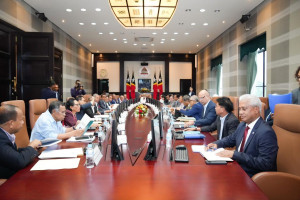CPLP Executive Secretary advocates for political and financial reinforcement to allow Timor-Leste to fully tap into the organisation’s potential for the country

The Executive Secretary of the Community of Portuguese-Speaking Countries (CPLP – acronym in Portuguese), Zacarias da Costa, on an official visit to Timor-Leste, went to the Council of Ministers meeting on March 13th, 2024, to deliver a presentation on the potential of the CPLP for Timor-Leste.
During his speech, the CPLP Executive Secretary discussed the history of the CPLP's founding and Timor-Leste's accession as a member. He then analysed the CPLP’s mission, fundamental principles, and organisational structure. He also highlighted the areas of regional economic integration that comprise the organisation's member states and mentioned the operational instruments used within the CPLP.
Twenty-three years after joining the CPLP, Zacarias da Costa emphasised that Timor-Leste has made limited use of the resources available in the community, stating that the CPLP could strengthen Timor-Leste's capacity for international intervention, both through political diplomacy and in promoting economic and business cooperation, not only between member states but also in regional economic integration mechanisms. In this sense, the Executive Secretary of the CPLP defended the need for significant political and financial reinforcement, in complementarity, to allow Timor-Leste to exploit the potential of its membership in the CPLP.
Zacarias da Costa explained that this reinforcement, on a political level, could involve a candidacy for the Organisation's presidency, which seems consensual given the presidency's success in the 2014/2016 cycle. On the financial front, this reinforcement would involve contributions to the Special Fund, if possible, on a regular basis to ensure compliance with programmes to which such resources are earmarked.
The CPLP was established on July 17th, 1996, in Lisbon and comprises nine member states (Angola, Brazil, Cape Verde, Guinea-Bissau, Equatorial Guinea, Portugal, Mozambique, São Tomé and Príncipe and Timor-Leste). The CPLP member countries have a combined population of more than 284 million inhabitants, spread across the African, American, Asian and European continents. Estimates suggest that the population of the Community of Portuguese-speaking Countries will exceed 387 million by 2050 and reach almost 487 million by 2100.
Besides the presentation to the Council of Ministers, the CPLP delegation, led by Zacarias da Costa, also met with the President of the Republic, José Ramos-Horta and the Prime Minister, Kay Rala Xanana Gusmão.










































